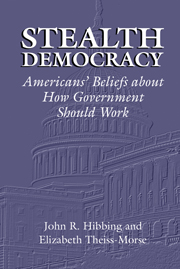Book contents
- Frontmatter
- Contents
- List of Figures
- List of Tables
- Acknowledgments
- Introduction
- PART I THE BENEFITS OF STUDYING THE PROCESSES PEOPLE WANT
- PART II THE PROCESSES PEOPLE WANT
- 4 Attitudes toward Specific Processes
- 5 Public Assessments of People and Politicians
- 6 Americans' Desire for Stealth Democracy
- PART III SHOULD PEOPLE BE GIVEN THE PROCESSES THEY WANT?
- Epilogue
- Appendix A
- Appendix B
- References
- Index
- Titles in the series
5 - Public Assessments of People and Politicians
Published online by Cambridge University Press: 23 November 2009
- Frontmatter
- Contents
- List of Figures
- List of Tables
- Acknowledgments
- Introduction
- PART I THE BENEFITS OF STUDYING THE PROCESSES PEOPLE WANT
- PART II THE PROCESSES PEOPLE WANT
- 4 Attitudes toward Specific Processes
- 5 Public Assessments of People and Politicians
- 6 Americans' Desire for Stealth Democracy
- PART III SHOULD PEOPLE BE GIVEN THE PROCESSES THEY WANT?
- Epilogue
- Appendix A
- Appendix B
- References
- Index
- Titles in the series
Summary
Does the federal government have too much power, about the right amount of power, or not enough power? A meager 5 percent, according to our national survey, believe that it has “not enough power.” Do the American people have too much power, about the right amount of power, or not enough power? Some 78 percent say “not enough power.” An overwhelming majority of American adults would like to see power moved away from elected officials and interest groups whom they perceive to be so influential. The primary purpose of this chapter is to dig a little deeper into why the people want to weaken existing institutions of government presumably by granting more power to ordinary people. What is it about the American people or about existing political institutions and elected officials that causes so many individuals to want to transfer political power from institutions to ordinary people? To answer this question, we rely heavily on focus group comments, but we begin this chapter by presenting the results of several survey questions relevant to the task at hand.
EMOTIONAL REACTIONS TO PEOPLE AND TO GOVERNMENT
If further evidence is needed of people's unfavorable reaction to government and relatively favorable reaction to ordinary American people, it can be found in a small battery of survey items on emotions. We asked respondents to tell us whether or not certain aspects of the political system made them feel proud and then asked whether those same aspects made them feel angry.
- Type
- Chapter
- Information
- Stealth DemocracyAmericans' Beliefs About How Government Should Work, pp. 107 - 128Publisher: Cambridge University PressPrint publication year: 2002



